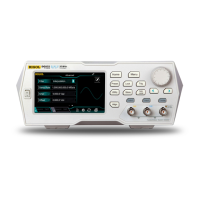Chapter 2 Performance Verification Test RIGOL
DG800 Performance Verification Guide
(A-0dBm) and judge whether it is within the specification range.
6. Keep the output impedance of CH1 of DG800 at 50Ω. Set the output waveform
of CH1 as a sine waveform with 10MHz frequency, 0dBm amplitude and 0V
dc
offset.
7. Keep the reference level, input attenuation, resolution bandwidth, peak offset
and sweep mode of the spectrum analyzer as 10dBm, 20dB, 1kHz, 3dB and
single respectively. Set its start frequency to 0Hz and stop frequency to 50MHz.
8. Press Sweep/Trig Single to perform a sweep.
9. After the spectrum analyzer finishes a sweep, use Peak and the marker
function to measure the maximum spurious signal (except harmonics) and
record the measurement result as A. Calculate the non-harmonic spurious signal
(A-0dBm) and judge whether it is within the specification range.
10. Keep the output impedance of CH1 of DG800 at 50Ω. Set the output waveform
of CH1 as a sine waveform with 20MHz frequency, 0dBm amplitude and 0V
dc
offset.
11. Keep the reference level, input attenuation, resolution bandwidth, peak offset
and sweep mode of the spectrum analyzer as 10dBm, 20dB, 1kHz, 3dB and
single respectively. Set its start frequency to 0Hz and stop frequency to 100MHz.
12. Repeat steps 8 and 9.
13. Keep the output impedance of CH1 of DG800 at 50Ω. Set the output waveform
of CH1 as a sine waveform with 30MHz frequency, 0dBm amplitude and 0V
dc
offset.
14. Keep the reference level, input attenuation, resolution bandwidth, peak offset
and sweep mode of the spectrum analyzer as 10dBm, 20dB, 1kHz, 3dB and
single respectively. Set its start frequency to 0Hz and stop frequency to 150MHz.
15. Repeat steps 8 and 9.
16. Repeat steps 1 to 15 to test the spurious signal (non-harmonic) of CH2 and
record the test results.

